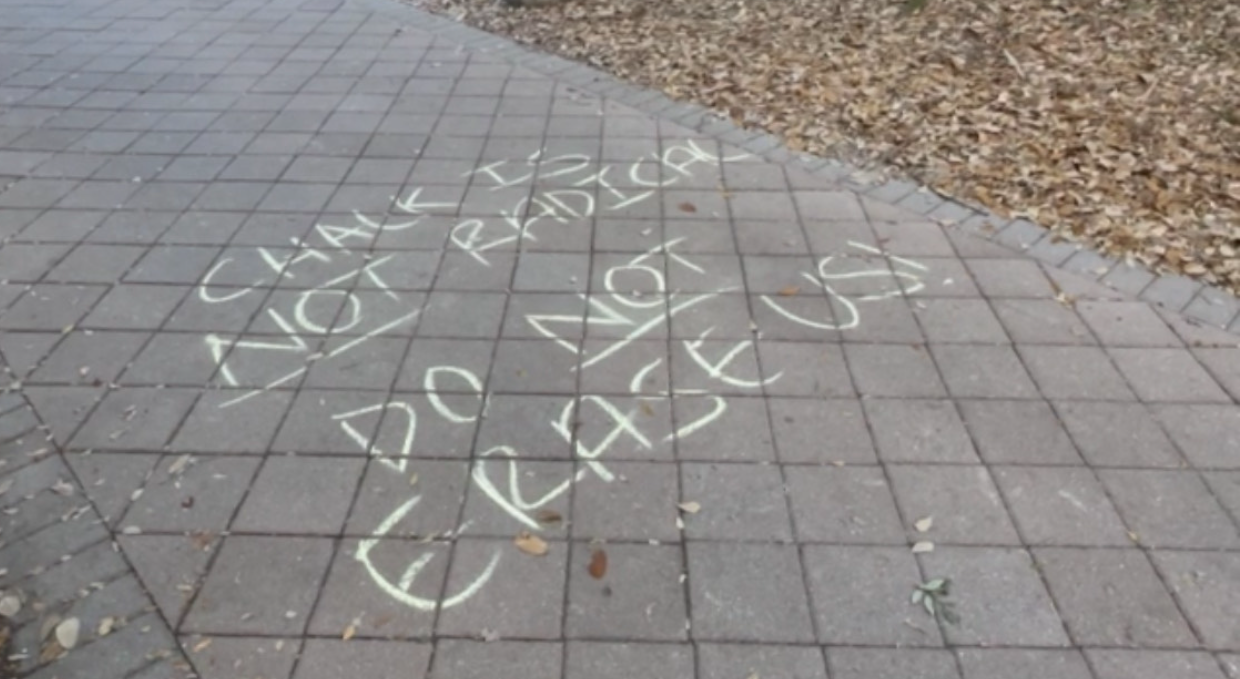By Isaac Tellechea & Mark McDermott
Navigating the conflicting interests of the campus is comparable enough to a minefield as-is, but students may have trudged over cultural tripwires without even taking notice—though authorities certainly have. Following the Feb. 23 walkout, the chalk impressions of resistance left by New College students dissatisfied with the current Board of Trustees (BOT) were first scrubbed away, and stories circulated of Student Affairs having discussions with students about the consequences of unauthorized chalking on campus. In light of turbulent times amidst a changing campus, it’s important for one to be familiar with the potential consequences this form of artistic protest may have.
Spring 2023 saw the overpass become a collective canvas whereupon visitors and residents would assemble a veritable 95 Theses against the BOT. Not long after, the orders came to the Physical Plant from administration to scrub clean the concrete walkway connecting the campus’ hemispheres. One such employee of the Physical Plant tasked with cleaning the controversial chalk—second-year Willem Aspinall—spoke to the Catalyst about their experience.
Aspinall came into work and was saddled with what Physical Plant Associate Director Curtis Davis described as an “urgent job”: to hose down the profanity-laden protest etched in chalked along the overpass.
“What he said to me and my co-worker was, ‘It’s fine to write on the overpass as long as it’s not profanity or threatening,’ but he’s not the one who makes the decisions,” Willem said. “I appreciate the sentiment of writing on the overpass—I think it’s a nice community thing and I liked seeing the chalk when I go by—but my boss was right: there was a lot of profanity, there were some threats on there, so I see why the powers that be wanted it removed.”
Regardless, Aspinall hopes that the scrubbing of the overpass doesn’t lead to cracking down on students’ ability to chalk the campus.
“I think it’s nice,” Aspinall commented. “Especially the nice messages. Me and my co-worker did leave up the two cats that said ‘blep’—we thought we could get away with that.”
While Aspinall hasn’t written on the overpass themself, they expressed support for the chalk’s messages, with a bit of a caveat for the profanity.
“I support most of the sentiments there,” Aspinall said. “Maybe not the exact messaging. […] I see the sentiment, I get where it’s coming from, and I’m not going to be angry at the people who are writing that, but I don’t know; it’s public space.”
In contrast, as a student, Aspinall believes that what was written shouldn’t have been erased.
“As a worker, I would have to have to be the one making the decision about what’s profane and should be removed,” Aspinall said. “I guess my message to people is that if you’re gonna write on the overpass, maybe don’t be so profane. What if there’s a kid coming by, right? I know that’s super unlikely and hypothetical, but it’s just something to think about.”
Aspinall’s conflicting views on the matter as a student and as a student worker represents an existing disconnect between a student’s understanding of the guidelines of chalk art on campus and the legal side of the issue. For example, Resident Advisors (RAs) have been known to hold community events where students are invited to chalk portions of campus together, creating a colorful canvas out of concrete. While these events in the past have not been the subject of legal scrutiny or any other criticism, the recent politically-charged chalk art has been put under a microscope and cleansed.
In order to clarify what kind of art would necessitate the aforementioned washing and scrubbing, the Catalyst was able to conduct multiple email interviews with the Campus Police Department (CPD), after continued difficulty to schedule one in-person.
“Chalking is a violation of Florida State Statute (F.S.S.) 806.13 (Criminal Mischief),” Chief Jennifer Coley wrote in the first email interview. “When we find any chalking, we have been instructed to create a work order to have the chalk removed immediately. [CPD] look at this infraction as a violation of the above mentioned state statute and have reported the violations as such. In the few cases where we have identified the person(s) responsible for the violation, rather than referring the case to the state attorney, we have used discretion and referred the case to Student Affairs. We trust that Student Affairs will handle the violation appropriately.”
It is worth mentioning that the statute states that the person committing the offense of criminal mischief must be “willfully and maliciously injuring or damaging any real or personal property belonging to another.” If found guilty of criminal mischief in a court of law, which is a second degree misdemeanor, possible consequences range from probation to 60 days in jail and up to a $500 fine. As stated above, CPD does not refer these cases to the state attorney.
“There are instances where chalking could lead to damage inside of a building,” Captain Kelley Masten wrote in a second email interview, explaining the purpose behind the regulations on campus chalking. “For example, if the chalk is transferred inside a building onto the carpets, it would require cleaning by NCF custodial staff and it could cause damage to the area.”
Additionally, Masten confirmed that “CPD does not get involved in approved chalking events.” Although CPD answered questions on state regulations and clarified several issues on the topic, certain questions sent over email were not clearly answered. These included inquiries on who has instructed CPD to have the chalk removed and what classifies as “willful and malicious injury or damage to real or personal property.”
In the end, what has been definitively confirmed by these interviews with Aspinall, Coley and Masten is that non-event chalking on campus will be removed by Physical Plant workers as reported by CPD. Importantly, as confirmed by Aspinall, the content of the chalk is evaluated and factors into the decision of whether or not the art should be removed.

